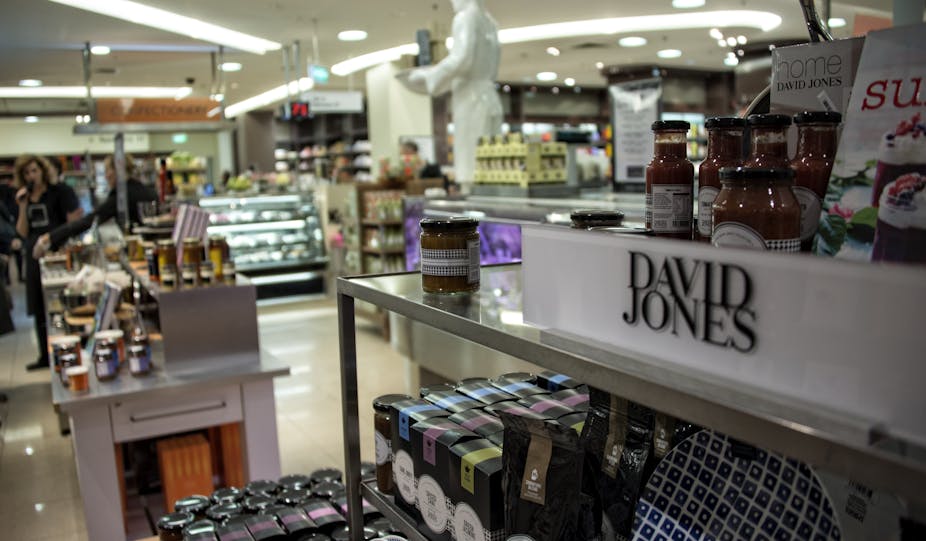While Australia’s supermarkets continue to battle on price, the South African owner of David Jones, Woolworths Holdings, has found a gap in the Australian grocery market and is preparing to exploit it.
Reports that the group has appointed Pieter de Wet to overhaul the David Jones food business signals once again the ever-changing face of the Australian food and grocery landscape. A re-energised David Jones food offer will provide positive outcomes for both shoppers and suppliers, while potentially becoming another headache for Coles and Woolworths.
A splintering market
Similar to the UK and Europe, the Australian grocery market is beginning to split into discounters at one end and mainstream supermarkets at the other. While the growth of discounter-style grocers continues to outperform supermarkets and convenience stores globally, the “top end” of the market appears ripe for exploitation.
Globalisation, innovation, multiculturalism, media, travel and the internet have shifted the power from the retailer to the consumer. Information-rich food shoppers are now more empowered to make decisions than ever before. Exotic food from around the world is available at local bistros across Australia suburbs. Reality television cooking shows and gourmet food markets tempt shoppers to seek out exclusive, unique fare.
The days of “meat and three veg” have long gone. Herein lays the opportunity for David Jones.
Value isn’t just about price
Media reports are claiming that rather than reporting to David Jones’ CEO Iain Nairn, de Wit will report directly through to Woolworths SA CEO Ian Moir – something that he has done since October 2014. This arrangement has accordingly added to the speculation that Woolworths SA is aiming to capture the high-end grocery segment by opening David Jones-branded food stores in a similar ilk to that of Marks & Spencer.
Such a strategy has proved successful in cushioning several international supermarkets from increased price discounting. Offering juice bars, free wine tasting, premium products and local food feature in UK supermarket Waitrose’s bid to continue to grow in a grocery market increasingly driven by discounters and price cuts.
Similarly, US supermarket Whole Foods has repositioned itself as the “healthiest grocery store” in America. This demonstrates a move away from a price-focused strategy. It appears that Woolworths SA is planning to initially refresh the current David Jones Food Hall offer, before potentially launching their own stand-alone sites similar to Woolworths’ Thomas Dux Grocer.
Risks
Woolworths SA was quick to hose down suggestions it was planning a move into food, citing the current increasingly competitive environment incumbents are operating within. Accordingly, entry into the sector without careful planning would be a risk for Woolworths SA given its current competitive nature.
The lack of an extensive supplier base is also problematic for food retailers entering international markets. Unlike general merchandise and apparel retailers, who mostly manufacture and produce overseas and import into a country, food retailers are highly dependent of domestic supply.
Notably, previous attempts to launch an upmarket grocer domestically have failed. Jones the Grocer’s Australian operations went bust in December 2014. Even in the UK, Marks & Spencer this week signalled the closure of nine of the food stores, suggesting the current location of stores were not a “good fit” for the business.
Clearly, targeting shoppers seeking premium, exclusive food products will represent a very small but profitable segment – if well executed. Careful selection of store locations and securing supplier support could drive long-term growth for Woolworths SA. Following a Marks & Spencer model, possibly co-located food stores within David Jones department stores, may be the safest way to enter the market.
Winners and losers
It is evident that Australia is becoming an attractive market for international retailers, with its growing middle class, low unemployment and relatively strong economy. Global players such as Aldi and Costco have already set up shop, while others like Lidl and Marks & Spencer are rumored to be circling.
As the food and grocery market continues to offer up new segments, new players will continue to enter, bringing with them greater choice for shoppers and stronger bargaining power for suppliers.

